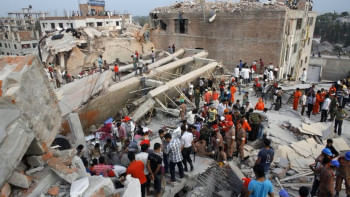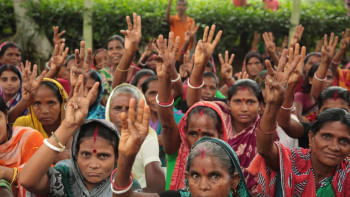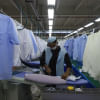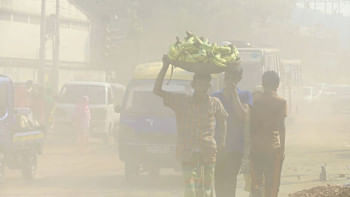‘Labour reforms must ensure a dignified life for workers’

Writer-researcher Altaf Parvez discusses the recommendations made by the Labour Reform Commission to improve the state of workers in the country, in a conversation with Monorom Polok of The Daily Star.
The political shift that Bangladesh experienced in 2024 saw huge sacrifices from workers, among others. It's been almost nine months since the uprising. How would you assess this period from the workers' perspective?
Among the martyrs of the July uprising, over a hundred were directly from the working class. Hundreds of the injured also came from working class families. Though the movement began over issues like quota reform, which mainly concerned the educated middle class, the massive participation of workers stemmed from two main reasons. First, the movement's slogans and commitments against inequality resonated with them. Second, in the two years leading up to 2024, workers faced severe threats to their income and livelihoods.
During Sheikh Hasina's tenure, workers were vulnerable in two significant ways. Whenever they demanded a wage increase, the industrial police were deployed against them. Additionally, the uncontrolled rise of commodity prices meant that their real income was decreasing. Typically, workers' annual wage increases are around five to six percent, but inflation rose at around 10 percent. This made life unbearable for them. They believed that if the government were ousted, their wages would increase, and they would be free from market syndicates.
The problem is, over the past eight or nine months, none of this has really happened. Bangladesh has set wages in 42 sectors over the years. This government needed to update them, but that hasn't been done yet. Moreover, syndicates still effectively control the commodity market. Beyond that, the government has not made any significant reforms in labour laws or improvements in the workers' living standards.
How should this issue be tackled in the new Bangladesh?
Workers should be given the opportunity to lead a dignified life, where they receive fair compensation for their labour in a competitive market. With that income, they should be able to live decently, ensuring food, clothing, education, and healthcare.
They must be provided with a safe working environment. If they suffer harm, they should receive compensation. They should have the opportunity to express their opinion on professional matters. They must have the right to form associations and select representatives to voice their concerns.
In other words, their lives should be legally protected and fall under the fundamental rights granted by the constitution. They should not be treated as domesticated animals; they should be recognised as equal human beings.
Recently, the Labour Reform Commission submitted its final report to the interim government with various recommendations, which include evaluating and revising workers' wages every three years, compensating workers if wages aren't paid on time, establishing an emergency fund for export-oriented industries, easing conditions for trade union formation, setting six months of maternity leave for female workers, and establishing a permanent labour commission. What are your thoughts on these proposals?
I have read the summary of the Labour Reform Commission's report. This May Day is the first to be observed under the government formed after the uprising. In that spirit, I believe that five to ten of the commission's recommendations should and can be implemented on a priority basis. The government often says that political consensus is needed for reforms. But if you look at the recommendations made by the commission, some of them are such that no political party would likely oppose them. For instance, providing appointment letters to workers—there's no reason to object to that.
By reforming labour laws, we need to grant legal recognition to various types of informal workers, including domestic workers, agricultural labourers, and gig workers. There is currently no updated database of workers. That work can start immediately.
In sectors where wages were set a long time ago, they should be updated promptly. Justice for major incidents of worker tragedies, like in the Rana Plaza disaster, should be expedited. In the upcoming national budget, the allocations for the two labour-related ministries can be increased to introduce new programmes. I don't see any reason for political parties to oppose these matters. Some reforms may require national-level consensus. Those discussions should also begin promptly.
Among these proposals, which reforms do you believe need to be implemented urgently?
For example, the Labour Reform Commission has stated that those who hire workers should be considered "employers," not "owners." Labour laws should be enforced for all such employers.
In some sectors, wages are inhumanely low. Wage boards need to convene quickly to address that. The institution responsible for overseeing workers' rights and factory conditions needs increased manpower, skills, and legal authority right away.
The number of labour courts should be significantly increased, and those presiding over them must be present and deliver judgments within stipulated times.
The government can immediately announce a national minimum wage standard. Many countries have this; we need it urgently as well. The government should adjust the minimum wage every three years based on market rates. To facilitate workers' right to form associations, the conditions for establishing trade unions should be relaxed.
How feasible is it to implement these proposed reforms? And what changes might they bring, especially considering that about 85-90 percent of the country's total labour force is employed in the informal economy?
Most of the Labour Reform Commission's recommendations are implementable and necessary in the national interest. Let me explain with an example. Regardless of which government comes to power, poverty alleviation should be a top priority. To lift people out of poverty, we need to ensure they earn considerably more than $2 a day. We cannot maintain an industrial situation where daily wages are lower than that. That contradicts the government's poverty alleviation policies. Moreover, those industries are profitable. Why should such low wages persist then? Look at the tea industry—it's been operating like this for long.
In the ready-made garment (RMG) industry, annual wage increases are in single digits, while inflation is in double digits. Yet, the RMG industry is growing. So, by allowing wage increases to lag behind inflation, what are we gaining? That workers in this sector get stuck in the grips of poverty? This goes against the declared policies of the political parties and the government.
You mentioned informal economy. Many workers in our workforce are still labourers. Those labourers need to be brought under labour laws as well.
Today, employers don't provide identity cards to domestic workers. This needs to be addressed. There must be some policies regarding them, and everyone should adhere to them. We cannot leave hundreds of thousands of domestic workers in a primitive state. Today, thousands of motorised rickshaws are operating in the country. We cannot avoid the tasks of licensing and training these drivers. The idea of shutting them down isn't realistic either. There are also millions of agricultural labourers in the country. During the months of Kartik and Agrahayan, they don't have work. For them, it is essential to introduce a "wage-for-work programme" during that time.
The Labour Reform Commission has addressed the issue of Dalits. A significant segment of the Dalit population are sanitation workers. They have been in Dhaka for several hundred years. Yet, they are all landless. They need to be rehabilitated on government land around Dhaka, and that is achievable. However, the question remains: will the government implement these? I believe that without political and social pressure, many of the reform recommendations may remain unrealised. Who will exert that pressure? Workers are unorganised. Their presence in political parties is also weak. So, for now, I cannot be overly optimistic.
Alongside labour reforms, justice for workers' deaths and injuries is also a fundamental demand. We have seen prolonged legal processes in cases like Rana Plaza, Tazreen Fashion, and Hashem Foods disasters.
It's a national shame and failure that even the Rana Plaza incident has not seen justice yet. The Rana Plaza tragedy proves that the lives of workers don't hold enough significance to our politicians or administration.
We are not ashamed of celebrating economic growth built on the corpses of workers. I prefer to call this not judicial delay, but neglect and indifference.
The Rana Plaza chapter has made it clear that tragedies endured by Bangladesh's working class do not evoke the same sense of responsibility in this country or its political circles as, say, other tragedies do.
But the unfortunate part is that after the mass uprising in July-August, we heard about the politics of "responsibility and empathy." There was a promise that ours would be an egalitarian "second republic." But where is that?
The Labour Reform Commission has addressed the matter of workers' dignity, proposing that they should not be addressed disrespectfully, as tui or tumi. But such changes cannot just be institutionally mandated; they require social transformation as well. How can that be achieved?
You are right; the contempt or rather disrespect for workers is a part of the social structure here. While our economy is capitalist, a vile feudal culture still exists in our social life. Society has not learnt to see labourers and workers with respect. However, the cause of this is related to both the state and politics. There has been no reform in our state and politics. Politics is still controlled by a few families. Industrial and economic institutions are also run in a feudal manner, without regard for laws and regulations. To end this, we need comprehensive and democratic reforms. The mass uprising demanded just that. Starting with a quota movement, about 1,400 people were killed in just a few weeks. Such a precedent is rare in the world. Our politics, our administration, our state are ill. Workers are the primary victims here, but others are also not safe. Even our educated people, wherever they work, are often treated like livestock, devoid of human dignity and sovereignty. We need to change this. Ensuring workers' rights and dignity must be seen as equally important.


 For all latest news, follow The Daily Star's Google News channel.
For all latest news, follow The Daily Star's Google News channel. 











Comments